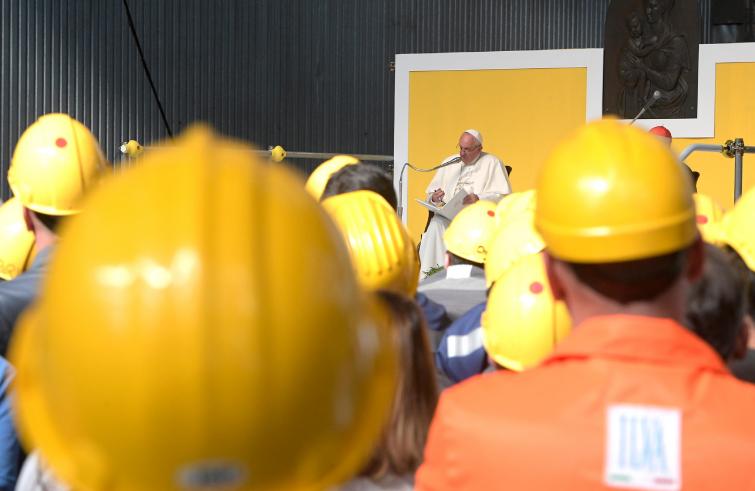
“I greet the workers of the Air Italy airline, and I hope that their working situation can be resolved in a positive way, respectful of the rights of all, especially of their families”, is the Pope’s appeal at the conclusion of the Wednesday General Audience in Paul VI Hall, during the greetings to the Italian-speaking faithful.
“It is essential to protect the rights of all workers”,
Francis said. The Holy Father recalled, as he had previously done in his greetings in other languages, the Week of Prayer for Christian Unity, which began yesterday: “Let us pray that all of Christ’s followers will persevere on the path towards unity.” Francis called on the faithful to pray for the people of the islands of Tonga, affected in recent days by the eruption of the underwater volcano. Continuing the cycle of catechesis on the figure of St Joseph, the Pope highlighted the paternal virtue of tenderness, at the heart of the parable of the merciful Father recounted in the Gospel of Luke.
“Tenderness is something greater than the logic of the world. It is an unexpected way of doing justice”,
Francis said: “God is not frightened by our sins, by our mistakes, our slip-ups, but he is frightened by the closure of our hearts, he is frightened by our lack of faith in his love. There is great tenderness in the experience of God’s love. And it is beautiful to think that the first person to transmit this reality to Jesus was Joseph himself.” In unscripted remarks, the Pope shared the story of a group of young people “who were struck by this parable of the merciful father and decided to create a pop theatre production on this matter, with this story. And they did it well.” “And the story is that, at the end, a friend listens to a son who is estranged from his father, who wanted to return home but was afraid that his father would kick him out and punish him – Francis continued – And the friend, said, ‘Send a messenger to say that you want to return home, and if your father will receive you, to put a handkerchief in the window, the one you can see as soon as you take the last part of the path home’. And this was done. And the work continues until the moment that the son turns onto the last stretch of the road and sees the house. And when he looks up, he sees the house full of white handkerchiefs.” “This is God’s mercy”, the Pope remarked:
“He is not deterred by our past, by the bad things we have done; settling the accounts with God is a beautiful thing, because we begin to talk, and he embraces us. Tenderness!”.
“The Lord does not take away all our weaknesses, but helps us to walk on with our weaknesses, taking us by the hand. He takes our weaknesses by the hand.” For tenderness, Francis explained, “is not primarily an emotional or sentimental matter:” “it consists in seeing God’s power pass through precisely that which makes us most fragile; on condition, however, that we are converted from the gaze of the Evil One, who makes us see and condemn our frailty.” “Tenderness is the best way to touch the frailty within us”, the Pope assured:
“Look how nurses touch the wounds of the sick: with tenderness, so as not to hurt them further. And this is how the Lord touches our wounds, with the same tenderness.”
“God always forgives: even the worst things. We are the ones who tire of asking for forgiveness”, Francis reiterated: “That is why it is so important to encounter God’s mercy, especially in the Sacrament of Reconciliation, in personal prayer with God, where we experience his truth and tenderness.” “Paradoxically, the evil one can also speak the truth to us: yet he does so only to condemn us”, the Pope noted: “The Lord tells us the truth and reaches out his hand to save us. We know that God’s truth does not condemn, but instead welcomes, embraces, sustains and forgives us.”
“Without this ‘revolution of tenderness’ we risk remaining imprisoned in a justice that does not allow us to rise easily and that confuses redemption with punishment”,
warned the Holy Father, who extended a special thought to “our brothers and sisters who are in prison”, at the end of his catechesis. “It is right that those who have done wrong should pay for their mistake, but it is equally right that those who have done wrong should be able to redeem themselves from their mistake”, Francis said, for
“There cannot be sentences without a window of hope:
Any sentence must always have a window of hope.” “Let us think of our brothers and sisters in prison, and let us pray for them, so they might find in that window of hope a way out towards a better life”, is the Pope’s exhortation to the faithful.









